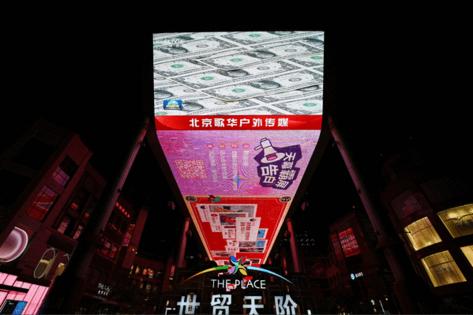China caps tariffs on US at 125%, calls Trump levies a 'joke'
Published in Political News
China retaliated against Donald Trump’s latest tariffs by hiking duties on all U.S. goods, while calling the administration’s actions a “joke” and saying it no longer considers them worth matching.
Beijing will raise tariffs on all U.S. goods from 84% to 125% starting April 12, the Ministry of Finance said on Friday, after the White House clarified that levies on Chinese goods rose to 145% this year.
“Given that American goods are no longer marketable in China under the current tariff rates, if the U.S. further raises tariffs on Chinese exports, China will disregard such measures,” according to the statement.
With tariffs at levels now set to halt most all trade between the world’s biggest economies, the concern now is that the economic fight could spill into other areas of the relationship. Trump and Xi are locked in a standoff over who will move to deescalate first: Trump has said he’s “waiting” for a call from Beijing, while Chinese officials have repeatedly said they’re open to negotiations but won’t be bullied into talking.
In a separate statement Friday, the Commerce Ministry said Washington’s repeated use of excessively high tariffs has become little more than a numbers game — economically meaningless and revealing its use of tariffs as a tool for bullying and coercion. “It’s become a joke,” the ministry said.
China also warned that it will “resolutely counterattack and fight to the end” if the U.S. substantially infringes on its rights and interests. It also said America should take full responsibility for the damage caused by the tariffs.
S&P 500 futures fell alongside European stocks after China’s announcement, while futures on the Hang Seng China Enterprises Index pared gains. The dollar also extended declines, pushing Bloomberg’s index of the U.S. currency to a more than 1% decline on the day.
What Bloomberg Economics Says ...
A full U.S.-China decoupling, once unthinkable, now looks much closer. For the economy, we see only one positive — Beijing may act fast, stimulating growth and advancing reforms to increase resilience to the trade shock.
Chang Shu, chief Asia economist
Tensions between Beijing and Washington have spiraled beyond tit-for-tat tariff exchanges in recent days to impact services and people-to-people ties. Chinese authorities on Thursday moved to cut the number of American films allowed in theaters. Officials also warned citizens against traveling to the U.S. and cautioned students about security risks in “certain states.”
The latest announcement is “not really an off ramp,” said Josef Gregory Mahoney, a professor of international relations at Shanghai’s East China Normal University. “It means this phase of tariff aggression has reached a dead end.”
The staggering U.S. tariffs on the world’s second-largest economy have triggered a tit-for-tat trade war that has unnerved global financial markets. Trump is imposing a 125% charge designed to both counter America’s trade deficit with China and punish Beijing for retaliating against U.S. import taxes. The number, published in a White House memo Thursday, comes in addition to a 20% levy put into place earlier this year over China’s role in fentanyl trafficking.
Prior to 2025, the average import taxes charged by each side on the other were less than 20%, even after the first trade war in Trump’s previous term in office.
So far, China has refused to cave to Trump’s pressure even as soaring duties are expected to weigh on the economy, with Goldman Sachs Group Inc. economists cutting their 2025 growth forecast to 4% from 4.5%.
President Xi Jinping on Friday made his first public remarks on the escalating trade war, saying China remains confident and unafraid of any “unjustified suppression.”
“One that goes against the world risks being isolated themselves,” Xi told visiting Spanish Prime Minister Pedro Sanchez.
Reaffirming China’s stance that there are no winners in a tariff war, Xi added that the country’s development has never relied on the goodwill of others. “No matter how the external environment changes, China will stay confident, remain calm, and focus on managing its own affairs,” he said.
Dylan Loh, assistant professor at the Nanyang Technological University in Singapore, said China’s response appears to be a calculated move as raising tariffs even further at this stage wouldn’t have much real impact.
“By signaling that China is going to ‘ignore,’ it allows Trump to claim a small tactical victory that may create space for negotiations,” he said. “They are also telegraphing to the world that they are the adult in the room and will not be led by Trump or simply be reacting to Trump’s every move.”
The U.S. and China now trade about $700 billion worth of goods each year. Without a deal to ease tensions, the higher tariffs will mean consumers and businesses on both sides are likely to face rising costs, as they scramble to adjust supply chains and reduce their tariff exposure.
Last year, the top U.S. imports from China included smartphones, laptops, and lithium-ion batteries. On the flip side, some of the biggest U.S. exports to China were liquid petroleum gas, oil, soybeans, gas turbines and machines used to produce semiconductors.
Wen-Ti Sung, a non-resident fellow at the Atlantic Council’s Global China Hub, said China is responding firmly to Trump’s tariff hikes while also trying to position itself as the more measured and restrained of the two superpowers.
The strategy, he said, is aimed at winning goodwill from other countries. “If the world is becoming increasingly bifurcated and other countries feel pressured to take sides, China wants to show it’s the less obsessively escalatory side,” he added.
----------
With assistance from James Mayger, Fran Wang and Jon Herskovitz.
©2025 Bloomberg L.P. Visit bloomberg.com. Distributed by Tribune Content Agency, LLC.




























































Comments